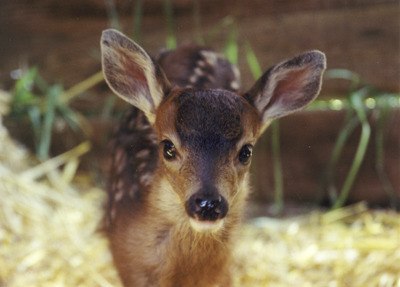By Jody Burns
It’s deer season in my garden. The little Bambis are ravishing the unprotected and helpless plants unlucky enough to have been planted outside the fence.
To date, the deer have eaten the Shasta daisies, the marjoram, the yarrow, the iris and the onions. They came back for seconds on the onions.
What thoughtless sin against the plant gods did I commit? I am thinking seriously of inviting Dick’s brother-in-law, whose living room is adorned with a stuffed moose head, to come north, with a loaded rifle under his arm.
I know.
You are muttering, “Well, you invaded their territory. What did you expect to happen?”
It’s true. I did and after five years of the above named plants being untouched, I expected those deer moms to pass the food taboos down to the next generation.
What is the younger generation coming to? Next thing you know they’ll be challenging the cat for the catnip.
I might be more relaxed about the deer siege if the raccoons and the birds hadn’t chosen 2011 to launch their assault on the fenced garden. They sent out scouts last year, taking a few almost ripe apples off the Florina. This year they’ve been at the strawberries. The birds, or the wet spring destroyed the pea crops even before the seeds could germinate. Not once, but twice.
I feel like Job every time I open the garden gate. I’m sure not expecting any tomatoes this year.
But I’ve got some weapons and I am going to launch them. First those cute doe-eyed four legged creatures are going to encounter a regular dose of Plantskyd or Bobbex, deer repellants that really work. I’ve mixed up a gallon jug and the sprayer is sitting by the front door.
The rain rinses deer repellent straight off, and the sun reduces its effectiveness. No more laziness about spraying. Every seven to 10 days.
Deer are habitual grazers and once you have deterred them they’ll stop strolling by to see what’s for dinner. That doesn’t mean you can stop spraying. They will return and find the restaurant open if you don’t continue.
If I weren’t such a cat person, I’d think seriously about getting a dog. Dogs don’t have to chase deer to frighten them. All they have to do is bark.
If you’ve got young trees be sure to put protective fencing or wrapping around the tree trunks. In the fall, bucks will rub their antlers against small tree trunks, (one to three inches in diameter) to remove the velvet grown during the summer.
The raccoons are more difficult. They’re smart and know how to use those amazing front paws. I’ve decided the only answer is to electrify the garden fence. An electric fence is not dangerous. It delivers a harmless, but memorable shock to the raccoons, which will look elsewhere for their next meal. Nor is it difficult to construct. Cenex in Burlington can give you the necessary information. Turn it on at night only, as raccoons are nocturnal animals.
Netting is the best way to deter birds from eating your blueberries. A tent constructed over your plants will save them. Or try Remay, a thin spun polyester fabric. Raintree Nursery is a good source for bird netting. Remay is available in most nurseries.
Whatever you do, don’t wait another day. Raccoons and birds have a sixth sense about when to pick your berries.
It’s always the evening or night right after you say to yourself, “I’ll pick those berries tomorrow. They’ll be perfect.”
Next day, the birds have enjoyed a feast and your berries are gone.
As always, the Master Gardeners are available to answer all your gardening questions. We’re at the Farmers Market every Saturday.
The next Diagnostic Clinic is Thursday, July 28 at the Washington State University extension office. Bring a sample of your problem and we’ll try our best to give you an answer.
Finally, if you’ve got to watch a movie, make sure it’s not Bambi.
Jody Burns is a Master Gardener for the WSU Master Gardener program.



